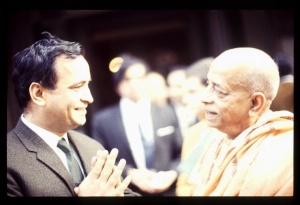CC Madhya 11.209 (1975): Difference between revisions
(Vanibot #0027: CCMirror - Mirror CC's 1996 edition to form a basis for 1975) |
(Vanibot #0020: VersionCompareLinker - added a link to the Version Compare feature) |
||
| Line 2: | Line 2: | ||
<div style="float:left">'''[[Sri Caitanya-caritamrta (1975)|Śrī Caitanya-caritāmṛta (1975)]] - [[CC Madhya (1975)|Madhya-līlā]] - [[CC Madhya 11 (1975)|Chapter 11: The Beḍā-kīrtana Pastimes of Śrī Caitanya Mahāprabhu]]'''</div> | <div style="float:left">'''[[Sri Caitanya-caritamrta (1975)|Śrī Caitanya-caritāmṛta (1975)]] - [[CC Madhya (1975)|Madhya-līlā]] - [[CC Madhya 11 (1975)|Chapter 11: The Beḍā-kīrtana Pastimes of Śrī Caitanya Mahāprabhu]]'''</div> | ||
<div style="float:right">[[File:Go-previous.png|link=CC Madhya 11.208 (1975)|Madhya-līlā 11.208]] '''[[CC Madhya 11.208 (1975)|Madhya-līlā 11.208]] - [[CC Madhya 11.210 (1975)|Madhya-līlā 11.210]]''' [[File:Go-next.png|link=CC Madhya 11.210 (1975)|Madhya-līlā 11.210]]</div> | <div style="float:right">[[File:Go-previous.png|link=CC Madhya 11.208 (1975)|Madhya-līlā 11.208]] '''[[CC Madhya 11.208 (1975)|Madhya-līlā 11.208]] - [[CC Madhya 11.210 (1975)|Madhya-līlā 11.210]]''' [[File:Go-next.png|link=CC Madhya 11.210 (1975)|Madhya-līlā 11.210]]</div> | ||
{{CompareVersions|CC|Madhya 11.209|CC 1975|CC 1996}} | |||
{{RandomImage}} | {{RandomImage}} | ||
==== TEXT 209 ==== | ==== TEXT 209 ==== | ||
| Line 11: | Line 10: | ||
<div class="verse"> | <div class="verse"> | ||
:nānā piṭhā-pānā khāya ākaṇṭha pūriyā | :nānā piṭhā-pānā khāya ākaṇṭha pūriyā | ||
:madhye madhye | :madhye madhye 'hari' kahe ānandita hañā | ||
</div> | </div> | ||
| Line 32: | Line 31: | ||
<div class="purport"> | <div class="purport"> | ||
It is the practice of Vaiṣṇavas while taking | It is the practice of Vaiṣṇavas while taking prasāda to chant the holy name of Lord Hari at intervals and also sing various songs, such as śarīra avidyā-jāla. Those who are honoring prasāda, accepting the remnants of food offered to the Deity, must always remember that prasāda is not ordinary food. Prasāda is transcendental. We are therefore reminded: | ||
Those who are not pious cannot understand the value of mahā- | :mahā-prasāde govinde | ||
:nāma-brahmaṇi vaiṣṇave | |||
:sv-alpa-puṇya-vatāṁ rājan | |||
:viśvāso naiva jāyate | |||
Those who are not pious cannot understand the value of mahā-prasāda or the holy name of the Lord. Both prasāda and the Lord's name are on the Brahman platform, or spiritual platform. One should never consider prasāda to be like ordinary hotel cooking. Nor should one touch any kind of food not offered to the Deity. Every Vaiṣṇava strictly follows this principle and does not accept any food that is not prasāda. One should take prasāda with great faith and should chant the holy name of the Lord and worship the Deity in the temple, always remembering that the Deity, mahā-prasāda and the holy name do not belong to the mundane platform. By worshiping the Deity, eating prasāda and chanting the Hare Kṛṣṇa mahā-mantra, one can always remain on the spiritual platform (brahma-bhūyāya kalpate). | |||
</div> | </div> | ||
Latest revision as of 06:30, 27 January 2020

A.C. Bhaktivedanta Swami Prabhupada
TEXT 209
- nānā piṭhā-pānā khāya ākaṇṭha pūriyā
- madhye madhye 'hari' kahe ānandita hañā
SYNONYMS
nānā—various; piṭhā-pānā—cakes and sweet rice; khāya—eat; ā-kaṇṭha pūriyā—filling up to the throat; madhye madhye—occasionally; hari—the holy name of Kṛṣṇa; kahe—they speak; ānandita hañā—in great jubilation.
TRANSLATION
They ate all kinds of cakes and sweet rice, filling themselves up to their throats, and at intervals they vibrated the holy name of the Lord in great jubilation.
PURPORT
It is the practice of Vaiṣṇavas while taking prasāda to chant the holy name of Lord Hari at intervals and also sing various songs, such as śarīra avidyā-jāla. Those who are honoring prasāda, accepting the remnants of food offered to the Deity, must always remember that prasāda is not ordinary food. Prasāda is transcendental. We are therefore reminded:
- mahā-prasāde govinde
- nāma-brahmaṇi vaiṣṇave
- sv-alpa-puṇya-vatāṁ rājan
- viśvāso naiva jāyate
Those who are not pious cannot understand the value of mahā-prasāda or the holy name of the Lord. Both prasāda and the Lord's name are on the Brahman platform, or spiritual platform. One should never consider prasāda to be like ordinary hotel cooking. Nor should one touch any kind of food not offered to the Deity. Every Vaiṣṇava strictly follows this principle and does not accept any food that is not prasāda. One should take prasāda with great faith and should chant the holy name of the Lord and worship the Deity in the temple, always remembering that the Deity, mahā-prasāda and the holy name do not belong to the mundane platform. By worshiping the Deity, eating prasāda and chanting the Hare Kṛṣṇa mahā-mantra, one can always remain on the spiritual platform (brahma-bhūyāya kalpate).